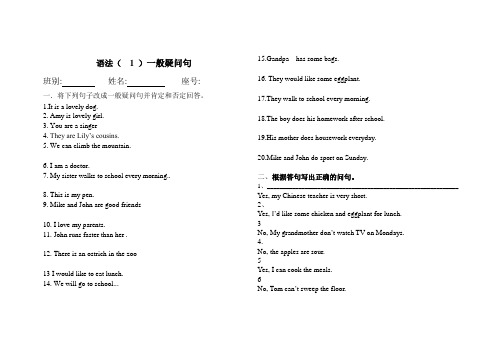1.一般疑问句复习课件
小学英语语法复习PPT课件(1)

小学英语语法
六、形容词和副词的比较级复习及练习
一、形容词的比较级
1、形容词比较级在句子中的运用:两个事物或人的比较用比 较级,比较级后面一般带有单词than。比较级前面可以用
more, a little 来修饰表示程度。than后的人称代词用主格
(口语中可用宾格)。 2.形容词加er的规则:
⑴一般在词尾加er ;
小学英语语法
4.以“f或fe”结尾,变f或fe为v, 再加-es, 如:knife-knives leaf——leaves 5.不规则名词复数: man-men, woman-women, child-children;foot-feet;tooth-teeth fish-fish, Chinese-Chinese, Japanese-Japanese
⑵以字母e 结尾,加r ;
⑶以1元音字母和1辅音字母结尾,应双写末尾的辅音字母, 再加er ; ⑷以“辅音字母+y”结尾,先把y变i,再加er 。
小学英语语法
3、不规则形容词比较级:good-better, beautifulmore beautiful 二、副词的比较级 1.形容词与副词的区别 (有be用形,有形用be;有 动用副,有副用动) ⑴在句子中形容词一般处于名词之前或be动词之后 ⑵副词在句子中最常见的是处于实义动词之后
小学英语语法
三、按照要求改写句子 1. Daniel watches TV every evening.(改为否定句) ___________________________________________________ 2. I do my homework every day.(改为一般疑问句,作否定回答) _____________________________________________________ ___ 3. She likes milk.(改为一般疑问句,作肯定回答) ___________________________ 4. We go to school every morning.(改为否定句) ___________________________________________________ 五、改错(划出错误的地方,将正确的写在横线上) 1. Is your brother speak English? __________________ 2. Does he likes going fishing? _________________ 3. He likes play games after class. _________________ 4. Mr. Wu teachs us English. __________________ 5. She don‟t do her homework on Sundays. _______________
句子的种类(50张PPT)初中英语专项复习课件

2.一般疑问句的回答 一般疑问句的肯定回答通常用“Yes,主语+be动词/情态动词/助动词”; 否定回答通常用“No,主语+be动词/情态动词/助动词+not”。not 习 惯上与前面的be动词、情态动词或助动词构成缩写词,但是be动词am 除 外。
三、选择疑问句 1.选择疑问句的回答 选择疑问句一般不用yes或no回答,而是选择一种情况回答。如: —Which one do you prefer,the red one or the blue one? 你更喜欢哪一件,红色的还是蓝色的? —I prefer the red one.我更喜欢红色的。
3.表示部分否定的词,如not all,not everything,not everybody,not everywhere,not always等。如: Not all students go to school by bike.不是所有的学生都骑自行车上 学。 4.宾语从句的否定形式:当主语为第一人称,谓语为 think,believe,suppose等词时,形式上否定主句实则否定宾语从句。如: I don’t think he’ll come. 我认为他不会来。
答案 A
解析 考查动词时态,本句为陈述句。句意:自从我来到长沙我们就没见过
面,但我们经常发邮件。根据since I came to Changsha可知,句子时态
为现在完成时,其构成为:have/has+动词过去分词,故选A项。
考点清单
分类
意义
肯定句
表示肯定的陈述
否定句
表示否定的陈述
例句
I get up at 6 o’clock every morning. 我每天早上六点起床。
中考复习课件(专题十二:简单句(陈述句、疑问句、祈使句、感叹句、倒装句)

她很少去游泳,是吗?
(4)陈述部分的主语为指物的不定代词时,问句部分的主语用
it。如:
Something is wrong with the computer, isn't it?
那台电脑有问题了,不是吗?
(5)陈述部分的主语为指人的不定代词时,问句部分的主语用
D. How long
专题12┃ 简单句(陈述句、疑问 句、祈使句、感叹句、倒装句)
( A )2. [2013·温州] —It's Father's Day,________? —Yes. Let's buy a gift for Dad.
A. isn't it
B. doesn't it
C. isn't he
专题12┃ 简单句(陈述句、疑问 句、祈使句、感叹句、倒装句)
┃考点过关 ┃ 基础过关 句型转换 1.Our school is beautiful.(改为感叹句)
___H_o_w___ _b_e_a_u_t_if_u_l our school is! 2.Diana made great success in her research because
—________. He went there on business last week.
A.No, he hasn't
B.Yes, he has
C.No, he has
D.Yes, he hasn't
专题12┃ 简单句(陈述句、疑问 句、祈使句、感叹句、倒装句)
( C )3. Don't make so much noise, Lily, ________?
一般疑问句1

Is it a tree?
变一般疑问句:
1、This is a book . Is this a book ? 2、That is a pencil . Is that a pencil ? 3、It is a pen. Is it a pen ? 4、She is six years old. Is she six years old?
5)There are some pictures on the wall. Are there _______ ______ _______ any pictures on the wall?
陈述句变一般疑问句:2.句子中有情态动词(can) 的,把情态动词提到句首。
三问号 一提、二变、
Can They they can play football ? .
什么是一般疑问句?
• 一般疑问句是疑问句的一种。它是指用Yes (是)或No(否)来回答的句子. 1.be动词(am,is,are)+主语+其他成分 2.情态动词(can)+主语+其他成分 3.助动词(do,does)+主语+其他成分
变句式按照步骤分一二三步 一提:指把be动词(am,is,are) 、情态 动词(can)提到主语的前面 一加:指加上助动词(do,does) 二变:指把相关的大小写做合理的 变化,对应的单词做变化。 三问号: 指把结尾的句号变成问号
2) Does ZhangPeng come from China?
肯:Yes, he does. 否:No, he doesn’t.
3) Do Amy and Sarah like China?
肯:Yes, they do. 否:No, they don’t.
1月20日一般疑问句和特殊疑问句-讲解及练习

一般疑问句一、一般疑问句作答的疑问句叫一般疑问句。
其结构是be动词(am /is /are )主语+其他成分Yes,+主语+提问的词.否定:No,+主语+提问的词+not.Are you from Japan﹖Yes ,I am./ No, I'm not.Is her sister doing her homework now﹖Yes, she is./ No, she isn't.Does he work in a bank﹖Yes, he does./ No, he doesn't.Can you speak French﹖Yes, I can./ No, I can't.1.如句中有be 动词(am、is、are、was、were can、may、must …)可直接将它们提到句首,句末打上问号即可。
应将其改为第二人称。
例:It was rainy yesterday.→Was it rainy yesterday?Tom's father can play the piano.→Can Tom's father play the piano?2.如果句中没有be动词、助动词或情态动词,则根据谓语动词的形式借助do的相应形式放在句首。
具体方法是:如果谓语动词是原形,则借do;如果谓语动词是一般现在时第三人称单数形式,则借does;如果谓语动词是过去式,则借did. 需要注意的是,借does或did后,原句的谓语动词要变回原形。
例:They go to school by bike.→Do they go to school by bike?Bill gets up at 6:30 every day.→Does bill get up at 6:30 every day?The students saw a film yesterday.→Did the students see a film yesterday?二.陈述句变一般疑问句应注意的事项1.如果陈述句中有第一人称,则变问句时最好要变为第二人称。
语法(1)一般疑问句

语法( 1 )一般疑问句班别: 姓名: 座号:________一.将下列句子改成一般疑问句并肯定和否定回答。
1.It is a lovely dog._____________________________________2. Amy is lovely girl. _____________________________________3. You are a singer______________________________________4. They are Lily’s cousins. _________________________________5. We can climb the mountain. _________________________________________________________________________________6. I am a doctor. _______________________________________7. My sister walks to school every morning..______________________________________________________8. This is my pen. _______________________________________9. Mike and John are good friends__________________________ _______________________________________________________10. I love my parents. _____________________________________11. John runs faster than her ._____________________________________________________ 12. There is an ostrich in the zoo________________________________________________________13 I would like to eat lunch._________________________________14. We will go to school... __________________________________ 15.Gandpa has some bags.____________________________________16. They would like some eggplant. ___________________________ ________________________________________________________ 17.They walk to school every morning.________________________________________________________ 18.The boy does his homework after school._______________________________________________________ 19.His mother does housework everyday._______________________________________________________ 20.Mike and John do sport on Sunday._______________________________________________________二、根据答句写出正确的问句。
一般疑问句
一般疑问句一般疑问句是疑问句的一种,是只能用yes 或no来回答的问句,也叫是否问句。
一般疑问句有三种形式1.含be动词的一般疑问句结构:一般疑问句:be+主语+其他?肯定回答:Yes, 主语+ be 否定回答:No,主语+ be+not一般疑问句的改写三步曲1)找be动词(am/is/are)2)be 动词提前3)句末莫忘加问号2.含情态动词的一般疑问句结构:一般疑问句:情态动词+主语+其他?肯定回答:Yes, 主语+情态动词否定回答:No,主语+ 情态动词+not一般疑问句的改写三步曲1)找情态动词(can/may/must ... )2)情态动词提前3)句末莫忘加问号3.谓语动词是实义动词的一般疑问句结构:一般疑问句:助动词(do/does/did)+主语+动词原形+其他?肯定回答:Yes, 主语+do/does/did 否定回答:No,主语+ do/does/did+not 1)找准句子中谓语动词的时态(does用于第三人称单数,did 用于过去式)2)借助于助动词(助动词提前,句中的谓语动词要变为原形)3)句末莫忘加问号Note:1.如果主语是第一人称I/we,是变为一般疑问句时要转换为第二人称you,在肯定与否定回答中,人称仍然与陈述句的人称保持一到致2.如果主语不是人称代词,在肯定与否定回答中,在转换为相应的人称。
3.如果句中出现some,something,等,在变为一般疑问句时要变为any,anything等。
例句:1. I am a teacher.一般疑问句:Are you a teacher ?肯定回答:Yes, I am .否定回答:No, I’m not.2.My mother is a farmer.一般疑问句:Is your mother a farmer ?肯定回答:Yes, she is .否定回答:No, she isn’t.3.She can speak English.一般疑问句:Can she speak English ?肯定回答:Yes, she can .否定回答:No, she can’t.4.Lily and Lucy can sing.一般疑问句:Can Lily and Lucy sing ?肯定回答:Yes, they can.否定回答:No, they can’t.5.She wants something.一般疑问句:Does she want anything ?肯定回答:Yes, she does .否定回答:No, she doesn’t.6.We did our homework last night.一般疑问句:Did you do your homework last night ? 肯定回答:Yes, we did .否定回答:No, we didn’t.。
疑问句(25张PPT)初中英语专项复习课件
● (一)反义疑问句的两种基本句型
形式
例句
肯定陈述句+否定附加问句
The girl went home late yesterday,didn’t she?这女孩昨天回家晚,不是吗?
否定陈述句+肯定附加问句
You haven’t been to Beijing,have you?你没 去过北京,是吗?
● B.how often
● C.how soon
● ( C )8.—Daddy,
will you buy me a bendable phone (折叠手机)?
● —Oh,perhaps in a few months.
● A.how long
● B.how far
● C.how soon
● D.how often
● B.No,it isn’t
● C.No,they aren’t
● ( B )4.—Is the girl in red your friend?
●—
.She is learning Chinese now.
● A.Yes,it is
● B.Yes,she is
● C.Yes,she does
●
—I like coffee.我喜欢咖啡。
● 【典题链接】
● ( A )10.—Can you play volleyball or basketball?
●—
of them.I’m good at ball games.
● A.Both
● B.Either
● C.Neither
● D.None
● ( C )11.—When shall we go on a picnic,Saturday or Sunday?
一般疑问句复习课件
3.These are my parents.
Are these your parents? Yes, they are./No,they aren’t.
4.It is a pencil case.
Is it a pencil case? Yes, it is./No,it isn’t.
5.He is my friend.
----No, they _a_r_e_n_’_t_.
18.What ___is___ this in English? ---- It __is___ a watch.
19 What color ___i_s_ the bookcase?
---- It ___i_s__ red. 20.What ___a_re___ these?
1.This is my friend. 2. There are some books on the teacher’s desk. 3. They can swim. 4. These story-books are mine. 5. He goes to school on foot. 6. Mrs. Li and Kitty were here just now. 7. There was a building here last year. 8. I will look after my sister this Sunday. 9. Tom did his homework last night. 10.I have ever been to France. 11. Mike has gone to Beijing.
英语复习课件(人教):简单句陈述句、疑问句、反意疑问句、感叹句、祈使句、倒装句(共20张PPT)
反意疑问句的构成: 陈述句+附加疑问句?附加疑问句的 否定式必须缩写。
1.陈述句部分与附加疑问句部分意思相反: 前肯后否、 前否后肯。
Mary is a teacher, ___is_n_'_t_s_h_e_? He didn't tell you the story, ___d_id__h_e___? 2.反意疑问句的基本对应形式如下: (1)be动词对应be动词。如: She is a policewoman, __i_sn__'t_s_h_e__? (2)情态动词对应情态动词。如: He can drive the car, __c_a_n_'_t _h_e__?
语法互动(十二)┃简单句(陈述句、疑问句、 反意疑问句、感叹句、祈使句、倒装句)
考点、疑问句、 反意疑问句、感叹句、祈使句、倒装句)
W__h__a_t ___ a beautiful flower it is! 这是一朵多么漂亮的花啊! _W__h__at___ good news it is! 多好的消息啊! _H__o_w____ fast Jim runs! 吉姆跑得多么快啊!
语法互动(十二)┃简单句(陈述句、疑问句、 反意疑问句、感叹句、祈使句、倒装句)
考点一 陈述句 陈述句是用于陈述一个事实或表达说话人的看法的句子。
陈述句主要分为肯定句和否定句。 1.陈述句的肯定句式主要有五种基本句型 (1)“主语+系动词+表语” I am honored. 我很荣幸。 (2)“主语+不及物动词” The students work very hard. 学生们学习很努力。 (3)“主语+及物动词+宾语” I teach English. 我教英语。
语法互动(十二) 简单句(陈述句、 疑问句、反意疑问句、感叹句、
- 1、下载文档前请自行甄别文档内容的完整性,平台不提供额外的编辑、内容补充、找答案等附加服务。
- 2、"仅部分预览"的文档,不可在线预览部分如存在完整性等问题,可反馈申请退款(可完整预览的文档不适用该条件!)。
- 3、如文档侵犯您的权益,请联系客服反馈,我们会尽快为您处理(人工客服工作时间:9:00-18:30)。
根据问句作肯定回答或否定回答: 一、 以be 动词(am, is, are, was, were)开头
的一般疑问句。 1. Is Sarah sad today? she ______. is Yes, ______ 2. Are you playing chess , John and Mike? we _____ are . No, _____ 3. Is there a bookstore near the hospital? is there ______ No, ______ . 4. Are there any pictures on the wall? Yes, _______ there ______. are
May起头的一般疑问句,否答用 mustn t 5. Must I’ finish my homework first?
Yes, you must. /No, you needn’t.
Must起头的一般疑问句,否答用needn’t
6. Shall we go to the zoo? 是一个提建议的句型,回答一般用Ok. /Good idea.
三、以助动词(do, does, did, have, has)开头 的一般疑问句 1.Does your mother work in the cinema? ________________________. Yes, she does./No, she doesn’t 2.Do they go shopping every Sunday? ________________________. Yes, they do./No, they donJohn ’t climb a mountain? 3. Did ________________________. Yes, he did./No, he didn ’t ever been to Beijing? 4. Have you Yes, I have./No, I ________________________. haven t. 5. Has Tom’ finished his homework? Yes, he has./No, he hasn’t. ________________________.
把下列陈述句改为一般疑问句: (注意:把陈述句改 为一般疑问句时,一、二人称要做相应的变化.) 1.This is my friend. 2. There are some books on the teacher’s desk. 3. They can swim. 4. These story-books are mine. 5. He goes to school on foot. 6. Mrs. Li and Kitty were here just now. 7. There was a building here last year. 8. I will look after my sister this Sunday. 9. Tom did his homework last night. 10.I have ever been to France. 11. Mike has gone to Beijing.
助 动 词 位 于 句 首
1).以be动词、情态动词、助动词为首,句末有
问号(?)的句子;
2).能用yes/no(或者相当于yes/no)来回答的句子.
回答:
1.Am I wrong again? Yes , you are./ No, you aren’t. 2. Is this a map of China? Yes , it is./ No, it isn’t.
观察下列一般疑问句: be 动 1. Am I wrong again? 词 2. Is it a map of China? 位 3. Are you in Class 2, Grade 1? 于 4. Was he a teacher five years ago? 句 5. Were you in Class 2, Grade 1 last year?
(might)
助动词:do, does (did) have, has (had)
实义动词:run, eat, play, like…… 等
用be动词“am,is,are”填空
am Tony. 1. I ________ is his mother. 2. She ______ 3. He ______ is my brother. 4. It _______ a key. is are you? 5. How _______ are a student.(学生) 6. You ______ am her sister. 7. I _______ 8. She ______ is my cousin. is my grandfather. 9. He _______ is an orange. 10. It_______ is Is this your pen?--- Yes,it_______. 11. ________ 12. ________ Is that your backpack? is --- Yes, it_______. is your first name? 13. What _______ are my photos. 14. These _______
首
1. Can you spell it? 2. Can Lily speak Chinese? 3. May I come in? 4. Must I finish my homework first? 5. Will you go to the zoo? 情态动词位于句首 6. Shall we go to the zoo?
把下列句子改为一般疑问句,并作肯定回答和否定回答。
1.This is my sister.
Is this your sister?Yes, it is./No,it isn’t.
2. That is my brother.
Is that your brother?Yes, it is./No,it isn’t.
1. Can you spell it?
Yes, I can./No, I can’t.
2. Can Lily swim? Yes, she can./No, she can’t. 3. Will Jim go to the zoo? Yes, he will./No, he won’t
4. May I come in? Yes, you may. /Nonglish?
Yes, I do./No, I don’t.
2. Does she live in Beijing?
Yes, she does./No, she doesn’t.
3. Did you tell her the truth? Yes, I did./No, I didn’t. 4. Have you ever been to Beijing? Yes, I have./No, I haven’t. 5. Has Tom finished his homework? Yes, he has./No, he hasn’t.
3.These are my parents.
Are these your parents? Yes, they are./No,they aren’t.
4.It is a pencil case.
Is it a pencil case? Yes, it is./No,it isn’t.
5.He is my friend.
8.Alice is his good friend.
Is Alice his good friend? Yes,she is. No,she isn’t.
9.Anna and Mona are sisters.
Are Anna and Mona sister? Yes,they are. No,they aren’t.
1. Do you like English? 2. Does she live in Beijing? 3. Did you tell her the truth? 4. Have you ever been to Beijing? 5. Has Tom finished his homework? 定义:
10.The book is on the table.
Is the book on the table? Yes,it is. No,it isn’t.
二、以情态动词 开头的一般疑问句。 1. Can you cook the meals? No, _____ _____. I can’t 2. Can Jane dive ? Yes, ______ she ______. can 3. Will they play the piano this evening? Yes, ______ they ______. will 4. May I have a look? you ______. may (肯定) _____, Yes ______ 5. Must I attend the meeting? _____, No _______ you _______.( needn 否定) ’t
3. Are you from China? Yes , I am./ No, I’m not. 4. Was your father a teacher five years ago? Yes , he was./ No, he wasn’t. 5. Were the twins in Class 2, Grade 1 last year? Yes , they were./ No, they weren’t.
Welcome to my class
